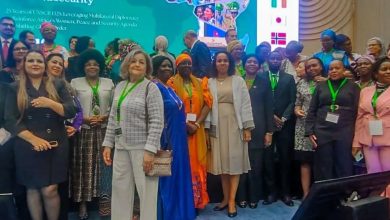LRF project transforms lives across Tanzania through food security and gender empowerment

DAR ES SALAAM: THE Livelihood and Right to Food (LRF) programme aims to contribute to the realisation of the right to food for women, men, young people and children in Kenya, Tanzania and Uganda by 2027.
This will be achieved through enhanced resilience and strengthened and equitable food systems within communities.
The objective of the LRF programme is to provide organised, empowered, assertive and resilient communities with sustainable livelihood opportunities.
This will be achieved by strengthening the capacities of local Civil Society Organisations (CSOs), cooperatives and member-based organisations to enable them to reach out to all their members, organise and empower communities by teaching them their civic rights and facilitate efficient service delivery by the CSOs and duty bearers.
In Tanzania, the project is conducted and supervised by We Effect, whose mission is to conduct development cooperation activities that strengthen local and member-based organisations comprised of women and men living in poverty.
The programme has six result areas, Strengthened Civil Society, Sustainable Livelihoods, Resilience, Equitable and Just Access to Adequate Housing, Gender Equality and Effective Equitable and Just Food Systems.
Tanzania is making significant strides toward realising the right to adequate food, aligning with global frameworks such as the FAO’s Voluntary Guidelines on the Right to Food.
These guidelines encourage countries to ensure universal access to sufficient, safe and nutritious food while promoting transparency and public participation in food systems.
The Ministry of Agriculture has made this right a priority, reflected in its 1.24 tri/- budget for 2025/26, more than four times higher than in 2021.
The budget targets key areas including irrigation, mechanisation, quality seeds, fertiliser use and expanded food reserves.
These efforts are paying off, Tanzania has maintained food self-sufficiency above 125 per cent, with food crop production rising from 20.4 million tonnes in 2022/23 to 22.8 million tonnes in 2023/24. Despite these advances, food insecurity remains a concern.
The latest IPC assessment (Feb–May 2025) found that 466,000 people were in Crisis (Phase 3), with numbers projected to drop to 242,000 between June and October.
The Food and Agriculture Organisation (FAO) emphasises that the right to adequate food is a fundamental human right, meaning everyone has the right to feed themselves in dignity and be free from hunger.
However, a broader assessment estimated that 1.7 million people, or 17 per cent of the population, remain severely food insecure.
Challenges such as climate shocks, high food prices and crop disease persist.
Still, Tanzania’s ongoing agricultural reforms and alignment with Agenda 2030 and Africa’s Agenda 2063 signal a firm national commitment to making the right to food a lived reality for all citizens.
Alongside government efforts, civil society organisations have played a vital role in monitoring, advocacy and community empowerment under the LRF.
According to We Effect, Tanzania, with a population of 61.3 million, faces significant challenges related to food insecurity, malnutrition and housing.
Between November 2023 and April 2024, approximately 900,000 people experienced acute food insecurity due to erratic rainfall, crop pests and livestock diseases.
These conditions have reduced crop production, limited food availability and affected the income of casual labourers.
ALSO READ: Gender equality, women’s empowerment advocates in Tanzania worth praise
Malnutrition remains a concern, with 31.8 per cent of children under five affected by stunting, although Tanzania is making progress towards some maternal and child nutrition targets.
The country also faces a housing deficit of 3 million units, particularly in urban areas like Dar es Salaam, where many families live in substandard conditions due to limited access to affordable housing.
The Tanzania Women Lawyers Association (TAWLA) is among the organisations partnering in this programme.
Their main task has been to survey and assess how far communities are benefiting from the project, particularly in terms of access to rights, justice and equality.
As part of this work, TAWLA has engaged with different beneficiaries to collect testimonies that show how the project is transforming lives.
During one field visit, TAWLA’s lawyer, Advocate Neema Ahmed, met with Mr Peter Gwivaha, a beneficiary from Njombe. Mr Gwivaha shared his experience, noting how the programme had improved his life and that of his family.
His testimony highlights how legal education and advocacy around gender equality can directly enhance livelihoods and food security.
“The project has contributed to improving my life and that of my family through education on rights and gender equality, the involvement of women in economic activities, as well as land and property ownership, which stimulates community development as a whole,” explained Mr Gwivaha.
Such testimonies demonstrate that the right to food goes beyond increasing agricultural yields.
It also encompasses ensuring equitable access to resources, empowering women and embedding rights-based approaches into development.
By fostering inclusion, participation and justice at the community level, programmes like the LRF strengthen resilience and open pathways for sustainable livelihoods.
In this context, TAWLA’s role is crucial, as their legal expertise ensures that issues of justice, gender and land rights are integrated into the broader framework of food security.
Their work helps communities not only to benefit from the programme but also to claim and defend their rights in the long term.
This linkage between rights and livelihoods forms the backbone of sustainable development.
As Tanzania continues to expand agricultural productivity, the inclusion of legal and social empowerment ensures that growth is equitable and transformative.
With the combined efforts of government, civil society and local communities, the vision of the LRF, resilient, empowered and food-secure societies, is increasingly within reach.
The LRF project is set to make a meaningful impact across five regions of Tanzania, reaching over 15 villages in total.
These regions have been carefully selected to ensure that the project addresses both rural and semi-urban communities, focusing on enhancing food security, income generation and social development.
In each village, the project works closely with local households, women’s groups and community leaders to raise awareness about the right to food, promote gender equality and support sustainable livelihoods.
By targeting multiple regions, the initiative aims to create a ripple effect, sharing best practices and lessons learned across communities for long-term development.





